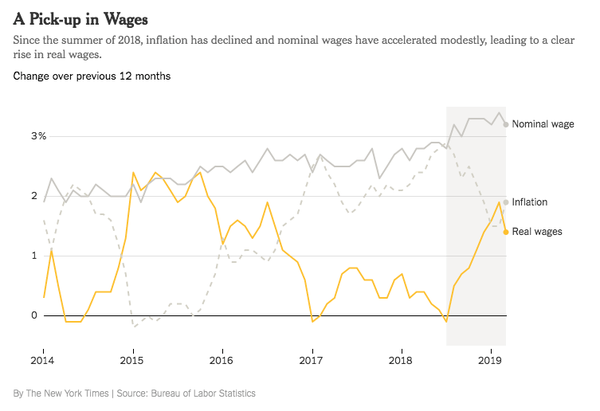|
|
Op-Ed Columnist
|
| You’ve no doubt seen the headlines: The unemployment rate is at its lowest level in nearly 50 years. Wages are rising at a decent clip. President Trump is taking credit, and his critics are nervous that this apparent Trump boom may help him win re-election. |
| How should you make sense of all this? I have three suggestions: |
| 1. The economy really has improved. |
| Last summer, I wrote about a wage slump: Although the economy was growing, the average hourly wage for private-sector workers was increasing at only about the same rate as inflation. Rising gas prices were a big reason. Since then, wage growth has picked up a bit, as the unemployment rate has continued to fall, and inflation has dropped noticeably. |
| The result is a clear rise in wages, as you can see in the yellow line above. That’s good news. Americans need a raise. But as the chart shows, the recent raise doesn’t reflect some wholly new dynamic in the job market. It’s more about inflation, which can be volatile, than nominal wages. |
| Perhaps even more notably, the chart shows that the recent wage gains are nothing remarkable. The increases in 2015 were larger. |
| 2. Trump’s policies have lifted short-term growth. |
| I didn’t like his tax cut, but it did inject a whole lot of money into the economy. That money has boosted economic growth in recent months. Paul Krugman explained the dynamic in a recent column, called “The Economics of Donald J. Keynes.” |
| Trump’s economic policy is also the subject of the new episode of “The Argument” podcast. Ross Douthat, Michelle Goldberg and I have some disagreements, but we all agree the economy is enjoying a temporary jolt right now. |
| 3. There are reasons to think it won’t last. |
| The federal government isn’t likely to pass a big tax cut again this year, which means the stimulative effects will start to wear off. There are already some signs of a potential slowdown: As good as the latest G.D.P. report was, even it offered reasons to think growth would soon slow, as Jason Furman of Harvard noted. |
| And although inflation isn’t about to spike, it does seem to be rising. Gas prices are again a big factor. After falling late last year, they’ve risen again this year. |

No comments:
Post a Comment